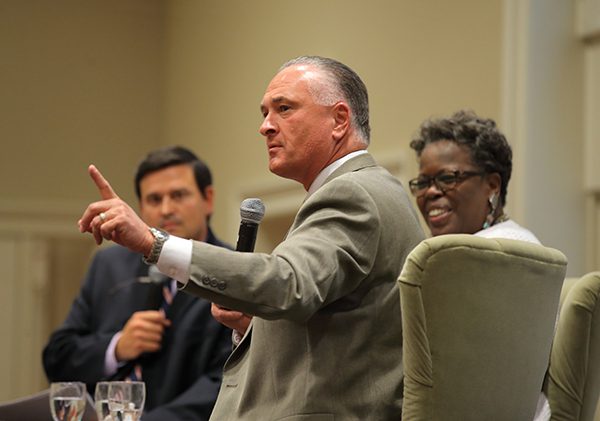Breaking the cycle

South Carolinians who are struggling need a living wage if they are ever to climb out of poverty, said a state representative at the summer series of StraightTalkSC, sponsored by the Riley Institute at Furman and Osher Lifelong Learning Institute at Furman.
The series “Can’t Win for Losing: The Crisis of the Working Poor” began with a forum Tuesday evening and will continue for the next three Tuesdays. The series is being moderated by Mark Quinn, director of public and member relations for the Electric Cooperatives of South Carolina. Tuesday’s session included Dr. Jessica Hennessey, an economics professor at Furman University, and Reps. Gilda Cobb-Hunter, D-Orangeburg and Kenny Bingham, R-Lexington.
A recent Kids Count report showed that 288,000 children in South Carolina—27 percent of all the state’s children—live in poverty. In Greenville County, that drops to 23.2 percent. South Carolina ranked 45th in the nation in the well-being of children—41st in economic well-being, 43rd in education and health and 41st in family and community support. All categories improved.
A number of the working poor working in minimum wage jobs earn less than the federal poverty line guidelines. Also many of them have a high school diploma or less. One study cited by Hennessey said that low earnings, periods of unemployment and involuntary part-time work were factors for 84 percent of the reason people are poor.
When trying to deal with poverty, she said, it makes sense to look primarily at those three factors.
“People have got to make a livable wage if they’re ever going to get out of poverty,” said Cobb-Hunter.
She and Bingham said that children who grow up in poverty often remain in poverty throughout their lives.
Bingham said that when he was running for school board, he said that disruptive children should be suspended. But he learned quickly that more was needed. If they are kicked out of school, often “they will find themselves in prison.” The district created an alternative school with small classes for these disruptive children. Many were disruptive because they had fallen behind grade level. In the alternative school, which was expensive, they felt successful.
“We need to make sure the money we spend is effective and gets results,” he said.
Change in the way things are done in South Carolina is necessary if the state is to improve, he said.
“We want change to be everyone else affected but not me,” Bingham said. “Unless change takes place we cannot move our state forward.” But that change needs to “have measured outcomes.”
Cobb-Hunter said she’s pleased with the work South Carolina is doing on expanding kindergarten for 4-year-olds, but emphasis needs to be placed on children in the infant to 3-year-old range.
“We are missing a golden opportunity” if the state doesn’t focus on its youngest children, she said. The Nurse-Family Partnership, begun in Greenville County, has expanded to 26 counties in the state. It works with pregnant women and young mothers to help them help their children toward success.
Education is vital in breaking the poverty cycle, Bingham said. “If a child is not reading on grade level by fourth grade, the majority will not graduate.” And statistics show that adults without a high school education have difficulty in finding and retaining employment.
He said that Medicaid, a rapidly rising cost in South Carolina, is the first item considered in the budget. Cobb-Hunter disagreed, saying that property tax reduction comes off the top of the budget before any programs are considered.
She said Medicaid should be expanded while Bingham said he wants to see access to health care improved in other ways. He also said he’s not in favor of increasing the minimum wage in the state although Cobb-Hunter has introduced legislation that would set a state minimum wage.
Hennessey said during her presentation that without the safety net provided by government programs, twice as many Americans would be impoverished as currently are. She cited a study that suggested those fighting poverty should focus on early childhood development, supporting disadvantaged youth, building skills and improving the safety net and work support as a last-ditch measure.